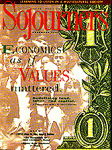Achtung Baby, U2's most commercially indulgent album, probed into the trappings of a world which they, throughout their existence, have struggled to avoid. Wrapped in an album cover of bright colors and flamboyancy, Achtung Baby embodied the eclectic spirit of '90s pop music, showcasing their own play with the frontiers of technological sound production.
The band's album-supporting Zoo TV tour furthered the album's extravagance with the grand mime of a stadium rock show and all the excesses that accompany it. The band's concert repertoire incorporated the conscience-over-riding, sense-assaulting blitz of modern electronic mass communications. Unashamed, U2 force-fed their audiences with self-centered bumper-sticker philosophy as Bono, the band's voice, incarnated the glitter and arrogance of a rock star with alter egos like the Mirror Ball Man and MacPhisto, the horned archnemesis of rock's Messiah.
Upon the end of the Zoo TV tour, U2 returned to the recording studio to "recover" before Zooropa, Zoo TV's European counterpart, commenced. Intending only to record a few tracks, the band ended up producing a whole album, named after their European tour. Released in early July, Zooropa follows up Achtung Baby in that remnants of ideas not expressed in the 1991 album find their place in Zooropa.
THE RECORD OPENS with the title track, an ode to modern Euro-American culture and all it has to offer. Recorded with a 1970s cosmic cartoon reverb, "Zooropa" is composed of a check list of Madison Avenue rhetoric that has cost Western civilization its sense of place and spirituality.
"Numb" continues with the Zooropa theme as it capitalizes on the automation of human emotions and instinct by the expectations and codes of society. The Edge, U2's guitarist, rap-sings in monotone to a flywheel, mechanical melody that approximates the noise of an assembly line.
The track most worthy of mention, "Lemon," dwells on the inspiring force behind creative expression, which may well be a means for the individual artist to better understand himself or herself. Supported by a traveling beat, organ reverb, and enchanting backing vocals (The Edge and U2 producer Brian Eno), Bono's falsetto takes the song to exciting heights, only to sing mid-range in his trademark mournful expression.
"Babyface" chimes in obsession with the frozen dames of celluloid and "Stay," inspired by the latest Wim Wenders film, Faraway, So Close!, summons murky images and feelings of the morning after. The seeming uselessness of "Daddy's Gonna Pay For Your Crashed Car" makes one wonder if daddy would pay the studio time for recording such a track.
"Some Days Are Better Than Others" explains itself, backed by a low and groovy Adam Clayton bass guitar and The Edge's chiming, buzzing strains. For the love felt for "The First Time" Bono gives up his inheritance, showing how far people may go to experience love. The Soup Dragon-ish "Dirty Day" clearly falls into the "other" category of "Some Days...."
The song "The Wanderer," a lonely and somewhat desperate traveling tune written for and sung by Johnny Cash, is a disappointment despite the familiar, low rumble of Cash's voice. The music composed for Cash matched his particular musical genre; however, it seemed too programmed and mechanical to accompany the likes of the man in black. His contribution would have been more consistent with the music of U2's earlier release Rattle and Hum than with that of Zooropa.
By virtue of Achtung Baby, Zooropa, and their respective tours, U2 seems to be more concerned about posturing for the change pop music and the world is experiencing rather than making great music. While the band gawks at the changes around them, it misses the opportunity to make history. Instead it retells history or reflects the most contemporary music trends.
Zooropa does not indicate much musical risk-taking on the band's part, but it still demonstrates the band's appeal to the best (yet disillusioned) instincts of humanity. And because of this, Zooropa makes a consistent contribution to U2's discography.
Robert Heckman was a student of modern music and also attended Biola University in La Mirada, California when this review appeared. He spent a semester as an intern at Sojourners in 1992.

Got something to say about what you're reading? We value your feedback!
